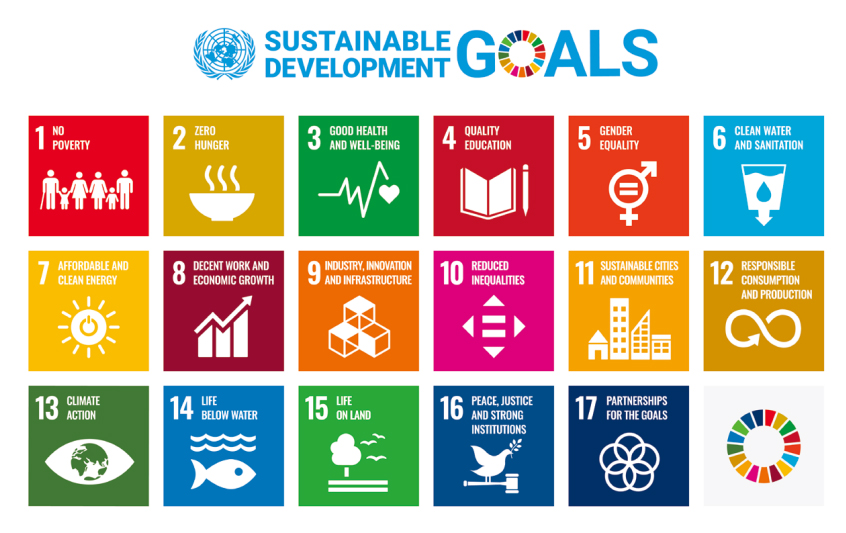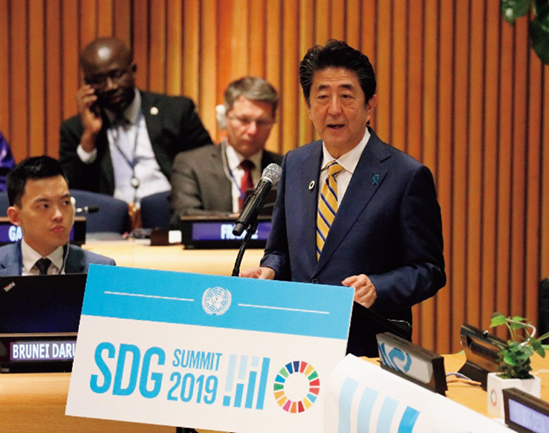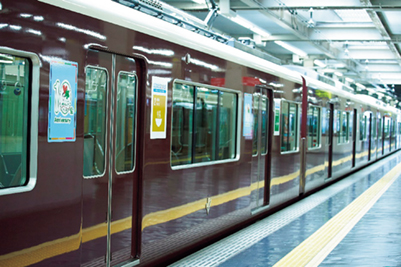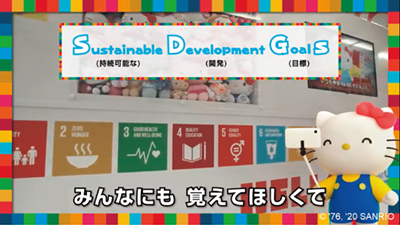ODA Topics 3
Efforts by the Government of Japan Aimed at Achieving the Sustainable Development Goals (SDGs)
2019: A year of demonstrating leadership worldwide and raising awareness in Japan
The Sustainable Development Goals (SDGs) are a set of international development goals to realize a sustainable and better world by 2030. As a successor to the Millennium Development Goals (MDGs) formulated in 2001, the SDGs are set out in “the 2030 Agenda for Sustainable Development” adopted at the UN Summit held in September 2015. The SDGs are an integrated initiative that harmonizes three aspects—economy, society, and the environment—considering them as inseparable with each other, and are universal goals that developed and developing countries should address together. The 2030 Agenda lists the “Sustainable Development Goals (SDGs) consisting of 17 goals and 169 targets, and advocate the principle that “no one is left behind.” This principle reflects the concept of human security, which Japan has been leading in the international community, and the whole of Japan is working as one to actively promote the SDGs.
After the adoption of the 2030 Agenda by the UN Summit in September 2015, Japan first built the foundations within Japan for the implementation of the SDGs. In particular, the SDGs Promotion Headquarters was set up in May 2016, headed by Prime Minister Abe and comprising all Cabinet Ministers as members, which established a system for the Government to work as one on the SDGs both domestically and internationally. Under the SDGs Promotion Headquarters, and through discussions by the SDGs Promotion Roundtable Meeting, comprising diverse stakeholders including the private sector, civil society, experts and international organizations, the SDGs Implementation Guiding Principles and the SDGs Action Plan were formulated. The former constitutes Japan’s national strategy toward the achievement of the SDGs, while the latter sets out concrete measures. At the Eighth Meeting of the SDGs Promotion Headquarters held in December 2019, the SDGs Implementation Guiding Principles were revised to take into account the initiatives implemented over the past four years, as well as the latest trends in the international community. Based on the SDGs Action Plan 2020, the Government renewed its determination to further accelerate initiatives that contribute to the achievement of the SDGs, in line with the following three pillars: (i) business and innovation, (ii) regional revitalization, and (iii) empowerment of the next generation and women.
At the G20 Osaka Summit held in June 2019, the G20 Osaka Leaders’ Declaration reaffirmed the leaders’ commitment to the achievement of the SDGs, including promoting free trade, driving global economic growth through innovation and addressing disparity, and contributing to environmental and global issues. Furthermore, as the G20 Presidency, Japan led discussions for the achievement of the SDGs in seven fields, namely quality infrastructure, disaster risk reduction, marine plastic litter, climate change, empowerment of women, health and education. Moreover, Japan is also leading efforts toward the achievement of the SDGs at other international fora including the Seventh Tokyo International Conference on African Development (TICAD7) held in Yokohama in August the same year where the promotion of Japanese SMEs and SDGs businesses in Africa, as well as the utilization of science, technology, and innovation for SDGs (STI for SDGs) were incorporated in the Yokohama Plan of Actions 2019―a list of actions for the implementation of the Yokohama Declaration 2019 adopted as TICAD7 outcome document (see “(10) STI for SDGs”). In light of these efforts, at the SDG Summit 2019 held at the United Nations in September 2019, Prime Minister Abe introduced how Japan has been promoting the SDGs through all-Japan efforts by sharing Japan’s achievements in advancing the SDGs over the past four years.
Japan has also been putting effort into public-private partnership for raising awareness regarding the SDGs in and outside of Japan. For example, in addition to convening the Japan SDGs Award to commend companies and organizations that have put in place excellent initiatives toward the realization of the SDGs, it is also actively engaged in other initiatives for increasing the visibility of the SDGs such as conducting lectures across the country, contributing articles to magazines, carrying out various publicity and awareness-raising activities in collaboration with the transportation industry, entertainment industry, and the press, and disseminating information through the Ministry of Foreign Affairs’ website*1 and social media.*2


Prime Minister Abe delivering a speech at the SDG Summit 2019 held at the United Nations (September 2019)
In recent years, ESG investment*3 has been growing worldwide, in which investors select and invest in companies with an outstanding track record in environmental initiatives and corporate governance. Seeing the potential of this trend, the Japanese business community is actively leading efforts to promote the SDGs, and their efforts have also contributed to the rapid spread of the SDGs concept in Japan. According to a survey, it is said that as many as approximately one out of four Japanese citizens has become aware of the SDGs. Furthermore, the development of “creators of a sustainable society” has been set out in the preamble and general provisions of the new national curriculum standards for school-age children, which will be fully implemented from FY2020. Consequently, efforts for Education for Sustainable Development (ESD) are gradually becoming more widespread in classrooms. ESD contributes to the achievement of all the SDGs by fostering creators of a sustainable society who can think and act on their own to solve problems. It is expected that through ESD, children will have more opportunities to learn about the concept and approach of the SDGs in their school life, leading to the younger generation as well as their parents acquiring a stronger awareness of the importance of the SDGs, and the younger generation’s participation in creating a sustainable future by 2030 and beyond.

With the aim of promoting the SDGs and raising awareness, Hankyu Hanshin Holdings, Inc. painted the SDGs logos on “SDGs trains” that operate along the Hankyu Kobe Main Line and Takarazuka Main Line (Photo: Hankyu Hanshin Holdings, Inc.)

Promotional video for the Sustainable Development Goals (SDGs) published on YouTube, produced through a collaboration between the Ministry of Foreign Affairs and Hello Kitty (Sanrio Co., Ltd.)
*1 Ministry of Foreign Affairs’ website on the JAPAN SDGs Action Platform, operated for the purpose of introducing SDGs initiatives that are being implemented widely across society. https://www.mofa.go.jp/mofaj/gaiko/oda/sdgs/index.html
*2 Ministry of Foreign Affairs’ SDGs Twitter: https://twitter.com/sdgs_mofa_japan
*3 Acronym for Environment (E), Social (S), and Governance (G).
